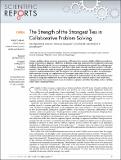| dc.contributor.author | de Montjoye, Yves-Alexandre | |
| dc.contributor.author | Stopczynski, Arkadiusz | |
| dc.contributor.author | Shmueli, Erez | |
| dc.contributor.author | Lehmann, Sune | |
| dc.contributor.author | Pentland, Alex Paul | |
| dc.date.accessioned | 2014-09-12T15:20:57Z | |
| dc.date.available | 2014-09-12T15:20:57Z | |
| dc.date.issued | 2014-06 | |
| dc.date.submitted | 2014-03 | |
| dc.identifier.issn | 2045-2322 | |
| dc.identifier.uri | http://hdl.handle.net/1721.1/89460 | |
| dc.description.abstract | Complex problem solving in science, engineering, and business has become a highly collaborative endeavor. Teams of scientists or engineers collaborate on projects using their social networks to gather new ideas and feedback. Here we bridge the literature on team performance and information networks by studying teams' problem solving abilities as a function of both their within-team networks and their members' extended networks. We show that, while an assigned team's performance is strongly correlated with its networks of expressive and instrumental ties, only the strongest ties in both networks have an effect on performance. Both networks of strong ties explain more of the variance than other factors, such as measured or self-evaluated technical competencies, or the personalities of the team members. In fact, the inclusion of the network of strong ties renders these factors non-significant in the statistical analysis. Our results have consequences for the organization of teams of scientists, engineers, and other knowledge workers tackling today's most complex problems. | en_US |
| dc.description.sponsorship | Belgian American Educational Foundation, Inc. | en_US |
| dc.description.sponsorship | U.S. Army Research Laboratory (Cooperative Agreement W911NF-09-2-0053) | en_US |
| dc.language.iso | en_US | |
| dc.publisher | Nature Publishing Group | en_US |
| dc.relation.isversionof | http://dx.doi.org/10.1038/srep05277 | en_US |
| dc.rights | Creative Commons Attribution | en_US |
| dc.rights.uri | http:// creativecommons.org/licenses/by-nc-nd/4.0/ | en_US |
| dc.source | Nature Publishing Group | en_US |
| dc.title | The Strength of the Strongest Ties in Collaborative Problem Solving | en_US |
| dc.type | Article | en_US |
| dc.identifier.citation | De Montjoye, Yves-Alexandre, Arkadiusz Stopczynski, Erez Shmueli, Alex Pentland, and Sune Lehmann. “The Strength of the Strongest Ties in Collaborative Problem Solving.” Sci. Rep. 4 (June 20, 2014). | en_US |
| dc.contributor.department | Massachusetts Institute of Technology. Media Laboratory | en_US |
| dc.contributor.department | Program in Media Arts and Sciences (Massachusetts Institute of Technology) | en_US |
| dc.contributor.mitauthor | de Montjoye, Yves-Alexandre | en_US |
| dc.contributor.mitauthor | Stopczynski, Arkadiusz | en_US |
| dc.contributor.mitauthor | Shmueli, Erez | en_US |
| dc.contributor.mitauthor | Pentland, Alex Paul | en_US |
| dc.relation.journal | Scientific Reports | en_US |
| dc.eprint.version | Final published version | en_US |
| dc.type.uri | http://purl.org/eprint/type/JournalArticle | en_US |
| eprint.status | http://purl.org/eprint/status/PeerReviewed | en_US |
| dspace.orderedauthors | de Montjoye, Yves-Alexandre; Stopczynski, Arkadiusz; Shmueli, Erez; Pentland, Alex; Lehmann, Sune | en_US |
| dc.identifier.orcid | https://orcid.org/0000-0002-8053-9983 | |
| dc.identifier.orcid | https://orcid.org/0000-0002-0346-2994 | |
| dc.identifier.orcid | https://orcid.org/0000-0001-9086-589X | |
| mit.license | PUBLISHER_CC | en_US |
| mit.metadata.status | Complete | |
